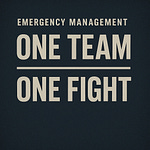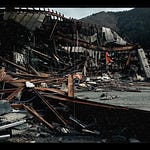
The other day I was talking to a group of young emergency management students. One of them asked me how I have coped with the tragedies I have seen over the years of my service.
Studies have shown that laughter and humor can help to reduce stress by releasing endorphins, the body's natural feel-good chemicals. Humor can also temporarily distract from stress, allowing a person to step back from the situation and regain a sense of perspective.
I took the opportunity to interview Jason Patton from the Fire Department Coffee company. You may have seen his videos making fun of Fire Department TV shows and making light of the stress that first responders deal with daily. He talked about how dark humor, or gallows humor, has been proven to be a coping mechanism that those of us that have seen death firsthand deal with the what we have seen.
Every call that we respond to impacts the mental health of disaster responders. And for most of us, the combination of calls we are part of and the traumatic events we witness affect our mental well-being.
No matter how strong you think you are, you are impacted by the calls and disasters you respond to. After a particularly gruesome crime scene that I responded to, our command staff made the team attend group debriefing and counseling. During the pear counseling session, the guy leading the discussion brought up the concept of the pebbles in the backpack. That each call we respond to, we take a little away. And at some point, the backpack will get heavy, and as a team, we need to recognize when our partners are not caring about the weight well, and we need to help them. That Stuck with me the idea of the backpack getting heavy.
The worst part about this situation was that I did not realize that my backpack was full. It was not until a few years later that I understood that I was dealing with PTS, that I was not me. I was drinking too much, acting recklessly, pushing away people who loved me and making bad decisions.
It is that realization that it is okay to ask for help, talk to people, and be vulnerable and open.
It is essential to prioritize mental health awareness for disaster responders. Having a deep understanding of critical incident mental health is vital for disaster responders, and we need to know what can be done to support the members of our organization.
Why mental health is essential for disaster responders
Responding to a disaster often involves exposure to traumatic events, including death, injury, and destruction. This exposure can lead to symptoms of post-traumatic stress (PTS), anxiety, depression, and other mental health conditions.
Moreover, you may experience secondary traumatic stress, also known as vicarious trauma, as a result of hearing about the traumatic experiences of others. This can further exacerbate the past stressors that you may be holding onto concerns.
The consequences of untreated mental health problems can be significant. Disaster responders may struggle with substance abuse, relationship problems, and job burnout. In severe cases, they may even contemplate suicide.
Supporting disaster responders
There are several ways to support your team and promote mental health awareness. Some of the key strategies include:
Providing access to mental health resources: Disaster responders should have access to mental health resources, including counseling services, support groups, and employee assistance programs. These resources can provide them with a safe space to discuss their experiences and work through their emotions.
Encouraging self-care: Disaster responders should be encouraged to engage in self-care activities, such as exercise, mindfulness, and time with loved ones. These activities can help reduce stress and improve mental well-being.
Promoting a culture of openness: Organizations should promote a culture of openness in which disaster responders feel comfortable discussing their mental health concerns. This can include training supervisors and coworkers on the importance of mental health and how to provide support.
Providing debriefing sessions: Debriefing sessions provide a structured opportunity for disaster responders to process their experiences and share their thoughts and feelings. These sessions can be led by mental health professionals or peer support groups.
To answer the student's question, how have I dealt with the stress over the years?
I have a great support system, my wife and close friends, that allow me to cry, vent and talk about the issues that I am facing. My newfound ability to be open and vulnerable to people and knowing that I don’t have to take on all of the stress on my own. And I still use humor to laugh at myself.
Why is humor helpful? Laughing releases stress. In addition, humor can also foster a sense of camaraderie and build a sense of community among people who are dealing with similar stressful situations. It allows people to share their experiences and struggles and find common ground, which can provide comfort and support in difficult times.
Overall, gallows humor can be a helpful coping mechanism for managing stress and helping to deal with difficult situations. By using humor to gain a sense of control and perspective and by building community and connection, gallows humor can provide a sense of resilience and hope in the face of adversity.














Share this post